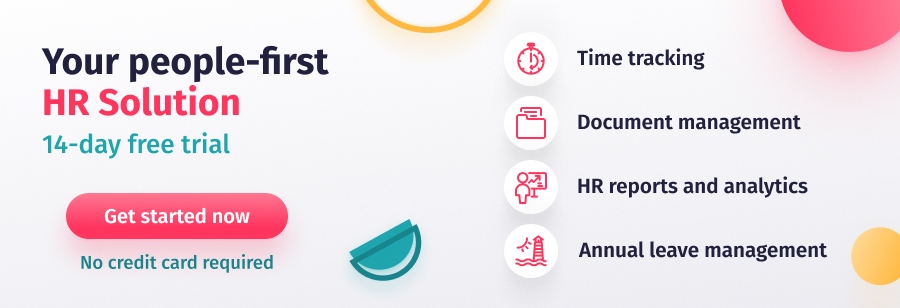Enforced by The Financial Conduct Authority (FCA) in the United Kingdom, the Senior Managers and Certification Regime (SMCR) is a regulation related to governance. It was created as a means to lessen consumer harm and promote market integrity by developing a system that allows institutions and regulators to hold individuals accountable in the finance industry. As of 2023, the SMCR (or SM&CR) affects:
- Banks (applicable since 2016)
- Dual-regulated insurers regulated by the FCA and the PRA
- Solo-regulated firms (applicable since 2019)
Essentially, the SMCR is here to ensure that those in senior positions within the finance industry aren’t abusing their power. In this article, we’ll cover:
- SMCR Functions
- SMCR Conduct Rules
- Application of the Conduct Rules
- Why is SMCR Critical for Senior Managers?
- Why is Employment Screening Important Under SMCR?
- Tips for Screening Under SMCR
- ✅Try Factorial Free for 14 Days
SMCR Functions
The SMCR has replaced the Approved Persons Regime (APR) since 2019 and establishes two new kinds of restricted functions: ‘Senior Management Functions’ (SMFs) and ‘Certification Functions’.
Senior Management Functions
Those in the coveted “Senior Manager” (SMF) role wield a tremendous amount of power and influence. This makes them highly accountable for ensuring the integrity of the market and preventing harm. But before they can step into their role, the FCA must give their stamp of approval. The FCA determines the necessary SMFs for a firm based on the firm’s classification, whether it’s a Limited Scope, Core or even Enhanced company.
Each Senior Manager has a “Statement of Responsibility” outlining precisely what they are accountable for. This must be submitted to the FCA during the approval process. Senior Managers have a “Duty of Responsibility” under the Financial Services and Markets Act (FSMA) to ensure the integrity of the market. It’s important to note that the head of the legal function isn’t considered an SMF. As lawyers are bound by legal restrictions, it’s a bit challenging to apply the Senior Managers Regime to their role. Instead, they’ll fall under the Certification Function and Conduct Rules.
Certification Functions
Any employee who is not a senior manager but has the potential to cause significant harm to the company or its customers hold a “Certification Function”. Unlike senior managers, individuals holding a Certification Function do not require prior approval from the FCA. Instead, the financial firm itself is responsible for ensuring those under the Certification Function are fit for their roles. Examples of certification functions include those who liaise with clients and are material risk-takers. Others include:
- CASS oversight
- Proprietary traders
- Significant management
- Functions that require qualifications
- Managers of certification employees
- Algorithmic traders
The Certification Regime is applicable to employees who spend more than 30 days a year in the UK or are based in the country. This regime is also applied to employees who liaise with clients and those who are material risk-takers, regardless if they’re overseas. Accordingly, institutions are mandated to re-certify individuals under the Certification Regime on an annual basis.
SMCR Conduct Rules
SMCR also requires that a code of conduct formally known as the “Conduct Rules” be prepared for almost all financial service professionals annually. The SMCR Conduct Rules are a collection of high-level codes that apply to almost all financial industry professionals. Meant to encourage compliance within SM&CR-affected enterprises, the FCA Handbook has an entire section dedicated to the Conduct Rules that offers all of the necessary information.
In short, there are two sets of Conduct Rules. The first set applies to all staff (including Senior Managers). The second set only applies to Senior Managers.
Known as first-tier or individual Conduct Rules, the following are applicable to all staff:
- You must act with integrity;
- You must act with due skill, care and diligence;
- You must be open and cooperative with the FCA, the PRA and other regulators;
- You must pay due regard to the interests of customers and treat them fairly;
- You must observe proper standards of market conduct.
Second-tier Conduct Rules – AKA Conduct Rules applicable to (only) Senior Managers:
- SC1: You must take reasonable steps to ensure that the business of the firm for which you are responsible is controlled effectively;
- SC2: You must take reasonable steps to ensure that the business of the firm for which you are responsible complies with the relevant requirements and standards of the regulatory system;
- SC3: You must take reasonable steps to ensure that any delegation of your responsibilities is to an appropriate person and that you oversee the discharge of the delegated responsibility effectively*;
- SC4: You must disclose appropriately any information of which the FCA or PRA would reasonably expect notice**.
*Inapplicable for non-approved Non-Executive Directors (NEDs)
**Applicable for non-approved NEDs in limited-scope firms

Application of the Conduct Rules
The Conduct Rules are in place to keep financial service providers and their employees in check. If you’re working for a company regulated by the Financial Conduct Authority (FCA), these rules apply to the financial activities of the company and any activities that could potentially harm the UK’s financial system or the company’s ability to meet regulatory requirements.
Nonetheless, the Conduct Rules don’t apply to everyone in the financial services industry. If you’re classified as a sole trader who’s not a senior manager or an “ancillary staff“ – a broad term with an extensive list that includes drivers, IT personnel, receptionists and more, you’re in the clear. However, if you’re an employee of a sole trader, the rules still apply to you. Appointed representatives also fall outside the scope of the Conduct Rules.
For individuals within the company, the Conduct Rules apply to senior managers, individuals acting as senior managers in emergency situations, non-executive directors who aren’t senior managers, certification employees, those in temporary UK roles and all other employees (except for “ancillary staff”).
However, for everyone else, the Conduct Rules only apply if you’re working in the UK or if you’re dealing with UK clients from an overseas branch of a UK firm. The FCA has an extensive interpretation of “dealing with” clients, which includes having contact with them, so it’s not just limited to financial dealings.
Why is SMCR Critical For Senior Managers?
A recent study revealed the financial services industry represents 8.3% of the country’s overall revenue – that’s worth over £170 billion. Needless to say, it’s an expensive sector that needs a high-level standard of governance. The SMCR regime is a key point that all financial institutions should have under wraps to determine who is responsible for a firm’s actions and decisions when things go wrong. Adhering to SMCR standards won’t only give organisations a boost in public trust, but it can also prevent unethical behaviour and reduce the risk of financial crime all the while protecting consumers.
But how does the SMCR impact the senior managers involved?
Continuous Improvement
Particularly advantageous for those who aspire to advance in their careers or are involved in succession planning in the finance industry, SMCR inspires professionals to keep refining their knowledge and abilities, ensuring that they maintain their expertise and stay ahead of the game.
Boosted Credibility
By complying with SMCR, you’re demonstrating that you take your duties seriously and are committed to maintaining the highest standards of conduct. This can enhance your reputation both within your organisation and in the wider industry, making you a more desirable candidate for advancements and opportunities.
Clear Understanding of Rules and Regulations
SMCR requires individuals to have a thorough understanding of their responsibilities and the regulations that apply to their role. This not only helps reduce the risk of regulatory violations but also gives individuals a deeper appreciation of the larger regulatory landscape, which can be helpful in future career journeys.
Reinforced Risk Management
SMCR places a strong emphasis on risk management, which is vital for individuals working in the financial services sector. By following the regime, you can feel confident that you’re taking all necessary measures to minimise the risks associated with your role, which can help safeguard your reputation and that of your organisation.
Higher Responsibility
SMCR makes individuals accountable for their actions and decisions, which can foster trust with stakeholders. By taking ownership of your role and showing that you’re committed to doing what’s right, you can improve your reputation and increase your credibility.
Why is Employment Screening Important Under SMCR?
Employment screening is important under the Senior Managers and Certification Regime (SMCR) for a number of reasons. A proper employment screening process will not only save time but also reduce the chances of having to be involved in legal or disciplinary procedures at the workplace. Here are several reasons why employment screening is crucial:
Maintaining high standards of conduct
SMCR is designed to improve standards of conduct and accountability within the financial services industry. Employment screening helps to ensure that individuals who are hired into senior positions have a clean track record and are of the highest integrity, thereby contributing to the overall aim of improving standards.
Minimising risk
Financial institutions are faced with many risks, including reputational risks, operational risks and legal risks. Employment screening can help to minimise these risks by ensuring that individuals who are hired are fit and proper to perform their roles.

Protecting stakeholders
SMCR is designed to protect stakeholders, including customers, shareholders and the wider public. Employment screening is an important part of ensuring that individuals who are appointed to senior positions are of good character and do not pose a risk to stakeholders.
Compliance with regulatory requirements
SMCR requires financial institutions to have in place effective systems and controls to ensure that they comply with regulatory requirements. Employment screening is one of the key controls that can help to ensure compliance with the regime.
Ensuring that individuals are competent
Arguably one of the most crucial points, SMCR requires individuals to have the knowledge, skills and experience to perform their roles. Employment screening can help to ensure that individuals who are hired have the necessary competencies to perform their roles effectively.
Tips for Screening Under SMCR
Usually a task for the recruitment team or recruitment manager, an effective screening under the Senior Managers and Certification Regime (SMCR) can be quite tedious. Here are some tips to help you get started:
Have a clear policy
To ensure that your employment screening processes are consistent and effective, it is important to have a clear policy in place. This should outline the types of checks that are required for each role, the criteria used to assess individuals, and the procedure for conducting the checks.
Check relevant databases
Conduct checks on relevant databases, such as the Financial Conduct Authority (FCA) register, to ensure that individuals have not been banned or restricted from working in the financial services industry. This is also crucial to verify the qualifications and experience of individuals and ensure that they have the necessary knowledge and skills to perform their roles effectively.
Conduct a background check
A background check is a crucial step to take before any hiring is considered. From referral checks to conducting criminal record checks, nothing is too extensive for senior positions, particularly those that involve access to sensitive information or significant amounts of money. In fact, criminal record checks are compulsory for SMFs.
Be thorough, don’t rush
Cutting corners not only puts you at the risk of hiring unsuitable individuals – but it can also jeopardise your institution of non-compliance with SMCR. A proper selection or screening process can be an ordeal with so many regulations to consider. However, rushing the process can make it even worse. Take your time to get to know the people you’re screening.
In sum, the finance industry is full of risks and is a critical sector for any country. On a path towards better governance and public trust, the SMCR represents the UK’s commitment to ensuring the stability and integrity of the financial services industry. Now that you know what SMCR is, how to comply with the regime and the importance of employment screening that comes along with it, make sure you’re up to date with changes to the SMCR and related regulations.





